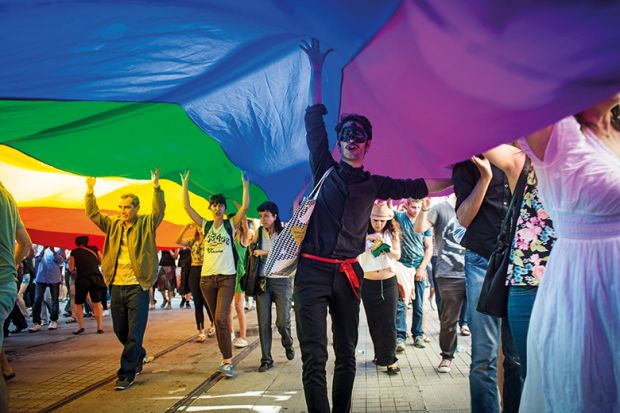The theme of this year’s European Association for International Education’s conference, “Encompassing all voices”, is both welcome and timely because international educators are beginning to recognise the variety of needs of
different student groups on our campuses.
A Universities UK International campaign to double the number of UK students who have an international mobility experience by 2020 has inspired many more students to follow this path. Endorsement by university leaders and financial support have helped these students a great deal. And short-term schemes such as summer schools have enabled less well-travelled students to take part.
For students and scholars coming to the UK, welcome programmes, buddy schemes, mentoring schemes, language and study skills support, advice services and social programmes all help to support them through their journeys and bring students together.
From research supported by the UK Council for International Student Affairs, we know that students’ unions also play an important role. Research by the University of Lincoln Students’ Union recommended a raft of practical steps to broaden student engagement, from appointing a dedicated officer for international students to offering taster sessions for students to experience society activities, and charging short-term membership fees for short-term students.
Meanwhile, research at the University of Edinburgh highlighted the particular challenges of scholars from African nations who found themselves in a minority for the first time: “I never had to think about race before,” recounted one student. Scholarship students find themselves under intense pressure as the research also highlighted: “You are said to be [a] strong, intelligent, unique individual, [a] scholar, a leader, something like that. So you always feel like, ‘I have to be strong, I have to put on a happy face, I have to act as if am brave’.”
These studies demonstrate the need for institutions to listen to students to understand their challenges, and that there is still work to be done.
For example, what about the voice of disabled students? One key challenge is encouraging students, from cultures where disability may rarely be discussed or even recognised, to disclose their condition to allow adjustments to be made for them on UK campuses.
When disseminating information we need to remember to utilise different formats: a student in a wheelchair may not see a poster but can read a message on social media.
At the same time, we must recognise students’ abilities: as one visually impaired student, presenting at the UKCISA annual conference in July 2019 stated, “We don’t want to be taken care of, we want to thrive. We have a lot to give.”
We also need to hear from commuter students. In the UK, this includes domestic students who have chosen to commute or who do not have the option of moving away from home, as well as less affluent students who are unable to pay the increasingly high cost of private student residences (which tend to be closer to the campus). It is important that they feel part of a global student community.
For those students who are due to return home, advice and support must continue right through to their return. Students who might have developed a different dress sense, attitudes, tastes, opinions, ideas and ambitions often underestimate how unsettling it can be to return to friends and family who have remained at home. Newly acquired learning must be shared and new-found voices must find expression.
From previous discussions at EAIE, it appears that this is an area of support requiring greater attention. That is why it is a focus of the workshop that UKCISA is presenting at this year’s conference with the University of Warwick and the École Nationale Supérieure de l’Électronique et de ses Applications (ENSEA).
I have not yet mentioned support for black and minority ethnic students; lesbian, gay, bisexual and trans students; Muslim, Jewish, Christian, Buddhist and atheist students; vegetarians and vegans; or introverts and extroverts. How can the education sector support such a diverse range of students with such an array of complex needs?
The fact is we cannot prepare students for every eventuality – nor should we. We know that learning most often evolves from points of friction and discomfort. Nevertheless, support that is available should be available to all. This may seem to be a daunting task considering the diversity of students’ needs and ever-shrinking budgets, but a comment from a PhD student, surveyed for research funded by UKCISA and carried out by the Open University and the University of Dundee, provides us with a useful message: “I’d like them to know I’m not only a student. I am a human being. I have perspectives about life. I have issues about life. I have different views about life, about everything here. About the system, the culture, the relations, about everything. This is what I am. Only a small part is a student.”
Keeping in mind, indeed celebrating, our common humanity is surely what an inclusive, international education that encompasses all voices is all about.
Julie Allen is director of policy and services at the UK Council for International Student Affairs.
Register to continue
Why register?
- Registration is free and only takes a moment
- Once registered, you can read 3 articles a month
- Sign up for our newsletter
Subscribe
Or subscribe for unlimited access to:
- Unlimited access to news, views, insights & reviews
- Digital editions
- Digital access to THE’s university and college rankings analysis
Already registered or a current subscriber? Login




